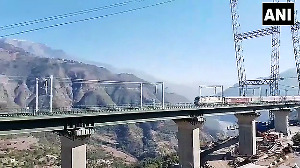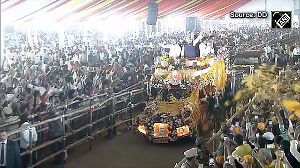Six hundred and ten America soldiers have died in Iraq so far.
The daily toll of American casualties increased by 10 on Sunday in the worst violence seen in Iraq after Saddam Hussein was overthrown last April.
Incited by the arrest of one of Shia extremist cleric Muqtada al-Sadr's deputies, his 'Mahdi Army' militia went on the rampage in Amarah, Baghdad, Najaf and Nasiriyah. When a semblance of calm returned to the streets, eight American soldiers were dead. Two other American troops died in an unrelated incident in Anbar.
Twenty-two Iraqis and a soldier from Salvador also died in the violence.
al-Sadr, who is only 31, is said to be the most anti-American of Iraq's many Shia clerics.
The violence ended only when al-Sadr asked that the militia -- dressed in the Islamic battle fatigues of black and green -- return to their homes.
al-Sadr's men have repeatedly needled American troops with their hit-and-run tactics. Despite the provocations, the American military command did not arrest Sadr. Saturday's arrest of Mustafa al-Yacoubi, one of his lieutenants, marked the first time they took on the cleric, who has considerable support among Iraq's youth.
al-Yacoubi is accused of masterminding the April 2003 assassination of Abdel Majid al-Khoei, a young moderate Shia leader.
In Sunday's well coordinated violence, al-Sadr supporters waged gun battles on American and Coalition troops.
The New York Times reported that seven US soldiers died in Sadr, in what the newspaper called 'one of the worst single losses for the American forces in any firefight since Baghdad was captured a year ago.'
Sunday's brutal violence follows the horrific incident in Fallujah, where four Americans -- members of a private security agency guarding American contractors -- were murdered. Their charred bodies were then dragged through the streets by jeering mobs, in an eerie reprise of the scenes in Mogadishu, Somalia, in October 1993. Two of the bodies were later hung from a bridge.
al-Sadr's Mahdi Army militia, The New York Times estimated, numbers 'tens of thousands across Iraq.'
'Together, the events in Fallujah and the other cities on Sunday appeared likely to shake the American hold on Iraq more than anything since the invasion that toppled Saddam Hussein's government last April 9,' The New York Times reported.
'Privately, senior American officers have said for months that American prospects here would plummet if the insurgency spread into the Shiite population, leaving American and allied troops with no safe havens anywhere except possibly in the Kurdish areas of the north,' the newspaper added.
Sunday's incidents marks the first time any Shia leader -- Shias comprise the majority in Iraq, and were brutally repressed by Saddam Hussein -- has openly taken on American and Coalition forces. If al-Sadr's example is copied by other Shia hardliners, Iraq could quickly turn into a cauldron of brutality like Lebanon between 1975 and 1990.






 © 2025 Rediff.com -
© 2025 Rediff.com -